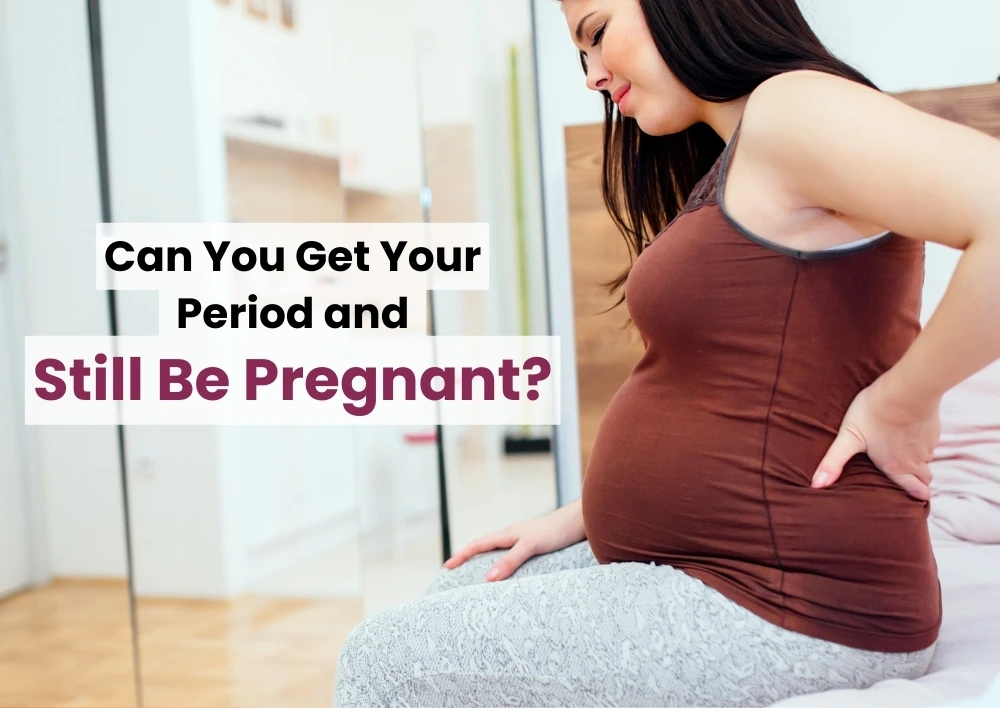Can You Get Your Period and Still Be Pregnant?
One of the first signs of pregnancy is a missed period, but what if you experience bleeding during pregnancy? Could it still be a period? This is a question that confuses many women, especially if they experience spotting or bleeding after confirming pregnancy. The answer is straightforward No, you cannot have periods during pregnancy, but certain types of bleeding during pregnancy may resemble a period.
Let’s understand the difference between periods and pregnancy-related bleeding, the possible causes, and what it means for your pregnancy.
What Is a Period?
According to the best gynaecologist in Gurgaon at Miracles Apollo Cradle, to understand the answer to Can you get your period and still be pregnant? We first need to clarify what a period is:
-
A period, or menstruation, is the shedding of the uterine lining when there is no pregnancy.
-
It occurs approximately every 28 days as part of the menstrual cycle.
When pregnancy occurs, hormonal changes prevent the shedding of the uterine lining, stopping menstruation altogether.
Can You Get Periods During Pregnancy?
No, you can not get periods while pregnant, however, periods like bleeding during early pregnancy can happen, but it is not the same as a menstrual period. Here is the reason:
-
Periods and Pregnancy are Mutually Exclusive
-
A period occurs when the body sheds the uterine lining due to the absence of a fertilized egg.
-
During pregnancy, the fertilized egg implants in the uterine lining, and the body works to sustain it. Hormones like progesterone prevent the uterine lining from shedding.
-
-
Bleeding May Be Confused with a Period
-
Some women experience light bleeding or spotting in early pregnancy, which can simulate a period.
-
However, this bleeding is caused by different factors, not the menstrual cycle.
-
Common Causes of Bleeding During Pregnancy
Bleeding during pregnancy can occur for several reasons, and understanding these causes can help differentiate between normal and concerning situations.
- Implantation bleeding is a common cause, occurring when the fertilized egg attaches to the uterine lining. This typically happens 6–12 days after ovulation and is characterized by light pink or brown spotting that lasts a day or two.
- Hormonal fluctuations can also lead to spotting, often around the time a woman’s period would have been due, making it easy to mistake it for a light period.
- Another cause is cervical sensitivity, which occurs due to increased blood flow to the cervix during pregnancy. Activities like sexual intercourse or a pelvic exam can sometimes trigger light spotting in such cases.
- In some instances, bleeding may be due to a subchorionic hemorrhage, which involves a buildup of blood between the uterine wall and the placenta. This condition can result in light to heavy bleeding, though it is often harmless with proper monitoring.
- More serious causes of pregnancy-related bleeding include miscarriage or ectopic pregnancy. A miscarriage is often accompanied by heavy bleeding, cramping, and abdominal pain, while an ectopic pregnancy, where the fertilized egg implants outside the uterus, can cause similar symptoms. Both require immediate medical attention to ensure the safety of the mother.
If you experience any bleeding during pregnancy, consult your gynaecologist to determine the cause and ensure appropriate care.
How Is Pregnancy Bleeding Different from a Period?
Bleeding during pregnancy can sometimes resemble a period, but there are key differences in its cause, appearance, and associated symptoms. Here is a detailed explanation of how bleeding during pregnancy is different from a period:
1. Cause
-
Menstrual Period: A period occurs when the uterine lining sheds because no fertilized egg implants. This process is initiated by a drop in progesterone and estrogen levels, signaling the end of the menstrual cycle.
-
Pregnancy Bleeding: Bleeding during pregnancy is not due to the shedding of the uterine lining. Instead, it could be caused by:
-
Implantation bleeding.
-
Hormonal changes.
-
Cervical sensitivity.
-
Other reasons like subchorionic hemorrhage or complications such as miscarriage or ectopic pregnancy.
-
2. Flow
-
Menstrual Period: The flow during a period is typically heavier, starting moderate to heavy and tapering off over several days. It may include clots and a steady flow of bright red blood.
-
Pregnancy Bleeding: Bleeding during pregnancy is often lighter than a period. It may appear as spotting or light flow and is generally pink, brown, or light red Heavy bleeding during pregnancy could indicate a complication and requires immediate medical attention.
3. Duration
-
Menstrual Period: A period typically lasts 3–7 days, depending on the individual’s cycle.
-
Pregnancy Bleeding: Pregnancy-related bleeding, such as implantation bleeding or spotting, usually lasts for 1–3 days and does not follow the regular pattern of a menstrual cycle.
4. Color
-
Menstrual Period: Period blood is often bright to dark red and may darken over time as the flow reduces.
-
Pregnancy Bleeding: Pregnancy bleeding is usually light pink or brown, especially during implantation. Occasionally, it can be light red, but it tends to be less vibrant than menstrual blood.
5. Timing
- Menstrual Period: Occurs at regular intervals, usually every 21–35 days, depending on the individual’s menstrual cycle.
-
Pregnancy Bleeding: Bleeding during pregnancy is not cyclic and can occur at any time. Implantation bleeding, for example, typically occurs 6–12 days after ovulation, not following the usual timing of a period.
6. Symptoms
-
Menstrual Period: Common symptoms include:
-
Cramps in the lower abdomen or back.
-
Bloating
-
Mood swings
-
Fatigue.
-
Breast tenderness and headaches.
-
-
Pregnancy Bleeding: Symptoms accompanying pregnancy bleeding are often related to early pregnancy signs, such as:
-
Nausea or morning sickness.
-
Breast soreness or tenderness.
-
Fatigue and frequent urination.
-
Mild cramping without the intensity of period pain.
-
7. Regularity
-
Menstrual Period: A period follows a predictable schedule and is part of the normal menstrual cycle.
-
Pregnancy Bleeding: Bleeding during pregnancy is unpredictable and doesn’t follow a regular cycle. It is often sporadic and unrelated to hormonal cycling.
Can Stress or Lifestyle Factors Cause Bleeding?
While stress, heavy exercise, or physical strain don’t directly cause menses during pregnancy, they can contribute to spotting. Pregnancy is a delicate time, and it is important to take care of your physical and mental health to avoid complications.
What to Do If You Experience Bleeding While Pregnant?
Periods during pregnancy can be confusing and worrying, but here is what you should do:
-
Take a Pregnancy Test: If you suspect pregnancy and experience bleeding, take a home pregnancy test to confirm. A positive test indicates pregnancy, even if bleeding occurs.
-
Consult Your Doctor: Any form of bleeding during pregnancy warrants medical attention. Your doctor may recommend:
-
Blood tests to check hormone levels.
-
An ultrasound (USG) to ensure the pregnancy is progressing normally.
-
-
Monitor the Bleeding: Track the color, flow, and duration of the bleeding. Inform your gynaecologist of any changes.
When to Seek Immediate Medical Attention?
While light spotting is generally harmless, heavy bleeding or bleeding accompanied by severe symptoms can indicate a serious problem. Seek immediate medical help if you experience:
-
Having a period during pregnancy with clots
-
Severe abdominal pain or cramping.
-
Dizziness, fainting, or low blood pressure.
-
Fever or chills.
Conclusion
Although it is impossible to have a true period while pregnant, bleeding during pregnancy can occur. The key is to understand the differences between menstrual bleeding and pregnancy-related spotting. If you experience any form of bleeding while pregnant, consult gynaecologist near you at Miracles Healthcare for a proper evaluation. Book your appointment today!
Frequently Asked Questions
No, a period cannot occur during pregnancy, but some females experience bleeding during pregnancy that may seem like a period.
Yes, you can experience light bleeding or spotting in an early pregnancy because of implantation or hormonal changes. However, if you experience heavy bleeding, it is important to consult a gynae near you.
It is not an actual period; bleeding during pregnancy may be due to any reason, such as implantation, hormonal fluctuations, or other early pregnancy causes.
No, but light spotting or implantation bleeding may occur around the time your period is expected.
No, implantation bleeding is usually very light and does not soak a pad like a normal period.
Mild bleeding or spotting is normal during early pregnancy, but heavy bleeding, clots, or cramping should be evaluated immediately.
Implantation bleeding is lighter, pink or brown, and lasts 1–2 days, while a period bleeding is heavier, red, and lasts longer.
Miracles Apollo Cradle, Gurgaon, has a team of highly experienced female obstetricians and gynecologists, offering advanced care and safe maternity services.















Was the information useful?
11 0